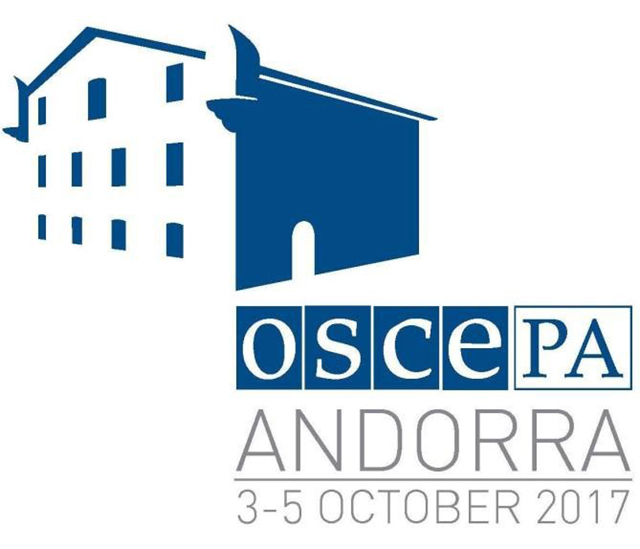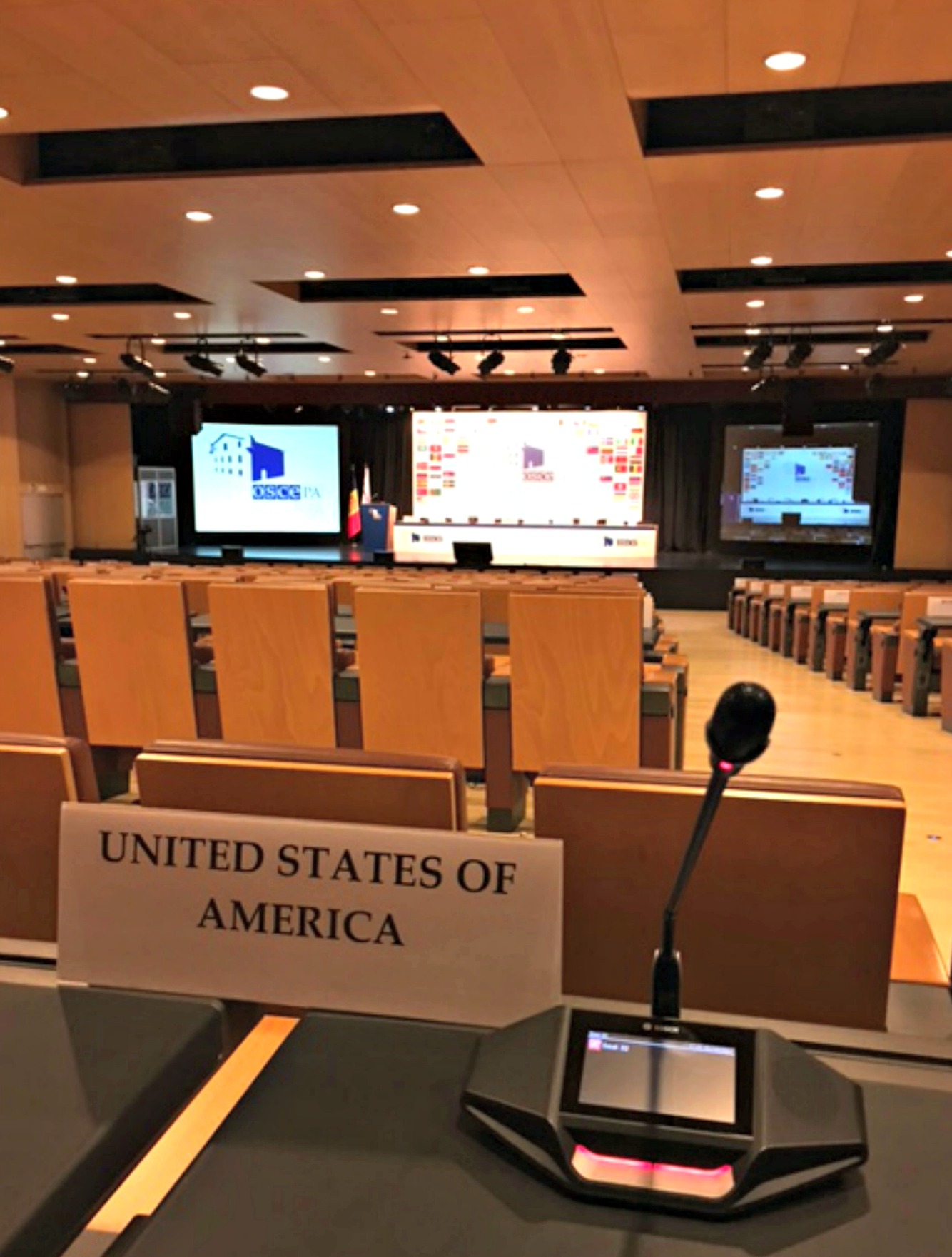By Bob Hand,
Policy Advisor

The Parliamentary Assembly of the Organization for Security and Cooperation in Europe (OSCE PA) held its 16th annual Autumn Meeting in Andorra la Vella (the capital of the principality of Andorra) from October 3 to October 5, 2017.
During the meeting, approximately 180 parliamentarians from among the 57 OSCE participating States – including Austrian parliamentarian and Assembly President Christine Muttonen – focused on “new challenges” and “new tasks” in region al security in formal sessions, on migration and counterterrorism in separate committee sessions, and on disability rights and human rights in occupied regions of Georgia in two separate side events. Other sessions at the event reviewed Assembly work since the July Annual Session in Minsk, Belarus, and discussed the possibilities for reforming the Assembly to make it a more effective OSCE institution.
al security in formal sessions, on migration and counterterrorism in separate committee sessions, and on disability rights and human rights in occupied regions of Georgia in two separate side events. Other sessions at the event reviewed Assembly work since the July Annual Session in Minsk, Belarus, and discussed the possibilities for reforming the Assembly to make it a more effective OSCE institution.
The Assembly’s Autumn Meetings are geared toward dialogue, and permit the parliamentarians to gather at least once between the early July Annual Sessions and the late February Winter Meetings. Although ongoing work in Washington prevented Members of Congress from participating in the Assembly meeting, the United States was represented by Helsinki Commission staff.
Sessions Devoted to Various Aspects of Security
Andorra’s Prime Minister and parliament speaker both welcomed members of the OSCE PA, while other host country officials made presentations in the formal sessions. OSCE officials also contributed to the discussions, including the Office for Democratic Institutions and Human Rights (ODIHR) Director Ingibjorg Gisladottir of Iceland; the Secretariat’s Coordinator of Activities to Address Transnational Threats Rasa Ostrauskaite of Lithuania; and its Deputy Coordinator of Economic and Environmental Activities Ralf Ernst of Germany. OSCE Parliamentary Assembly Secretary General Roberto Montella of Italy reported on the Secretariat’s activity in recent months, while German parliamentarian and OSCE PA Treasurer Doris Barnett reported on the Assembly’s financial situation.
In the formal sessions, a discussion of Mediterranean affairs focused on current issues including cooperation to counter terrorist threats and respond to migration challenges. New risks to security that come with the technologies of the cyber age, and the development of common responses to those risks, dominated the next formal session, with parliamentarians sharing country experiences. Regarding the climate change debate, there was nearly universal support for adherence to the Paris Agreement and the development of renewable energy sources, with most speakers emphasizing the dangerous implications of policies which maintain the status quo. Discussion of education issues highlighted the contribution that knowledge and experience can make in promoting tolerance, countering extremism and reconciling societies divided by recent conflict among today’s youth.
Work on the Sidelines
Ad Hoc Committees formed under the auspices of the OSCE PA also met to develop plans for further activity.
The committee dealing with migration, led by Swiss parliamentarian Filippo Lombardi, finalized a report that was then presented to the governments of the participating States on October 10. The report counters arguments that migration is solely a burden and stresses the need for all countries to share responsibility for large migration and refugee flows. The report also stresses that responses to migration must include actions to address its root causes, particularly in the case of forced displacement of large numbers of people. This very active committee also discussed a proposed calendar of future activities, including visits to key countries in the hope of gathering information that might provide useful to others.
The committee focusing on efforts to counter terrorism, led by Greek parliamentarian Makis Voridis, held its inaugural meeting in Andorra; it was created by the OSCE PA in July 2017. Participants offered their thoughts on what the Assembly and parliamentarians can contribute to the international response to terrorism, which included an emphasis on countering radicalization and violent extremism as well as sharing experiences and harmonizing legislation to make it more effective. New members were added to committee ranks, and a plan for future activity, starting with a visit to OSCE headquarters in Vienna, was developed.
In addition to these meetings, a subcommittee that focuses on the Assembly’s rules of procedure and reform of its practices met under the leadership of the United Kingdom’s Lord Peter Bowness. After adopting two packages changing procedures since 2013, the subcommittee remained open to further changes but concluded, based on a paper prepared by Lord Bowness, that broader and more radical reforms were needed to make the Parliamentary Assembly more relevant and effective. Some ideas were discussed, but the discussion is likely to be ongoing and will need to be widened to garner the support for changes to current practices.
The delegation of Finland hosted a side event on persons with disabilities and focused on encouraging parliamentary participation, featuring a young Serbian parliamentarian who is confined to a wheelchair. The delegation of Georgia hosted a second side event, which discussed the human rights challenges associated with Russia’s occupation of the country’s Abkhazia and South Ossetia (Tskhinvali) regions. Both events were well attended and welcomed for providing even more focused and less constrained discussion than the formal sessions of the meeting.
Developments in Neighboring Catalonia
The Autumn Meeting took place in the aftermath of the October 1 referendum on independence organized in the Spanish autonomous community of Catalonia. Most OSCE PA participants traveled to Andorra from Barcelona, the Catalonian capital, bringing their direct attention both to the referendum itself and to the actions of law enforcement dispatched by Madrid in an effort to block it.
The referendum raised two separate issues that were discussed by the parliamentarians in Andorra. The first was the legitimacy of the effort in the context of the right to self-determination, and the second was the right to freely associate and express one’s views, regardless of whether the result would be recognized officially in any fashion. Madrid’s response was clear; the referendum had been declared illegal in a court ruling and had no status. Still, the degree of force used by police was considered by several speakers at the OSCE PA meeting to be not just excessive but a violation of the basic human rights of participating citizens.
On October 4, 2017, OSCE PA President Muttonen spoke publicly from Andorra on the Catalonian events, urging “constructive dialogue and respect for the rule of law by all in Spain” and that “all the authorities to use due restraint and proportionality when enforcing the law.”
Future OSCE PA Activity
While its leadership will convene for a day-long session in Vienna on the eve of the annual meeting of the OSCE Ministerial Council, the next OSCE PA meeting open to all 323 parliamentarians will be the Winter Meeting on February 22 and 23, 2018, also in Vienna. Next year’s Annual Session is slated for Berlin from July 7 to 11, and the next Autumn Meeting will be held in Bishkek, Kyrgyzstan (dates to be determined). In between the meetings, parliamentarians hope to observe upcoming elections under OSCE PA auspices, and participate in other gatherings, including OSCE events, as part of the ongoing effort to strengthen security and cooperation in the OSCE region.




